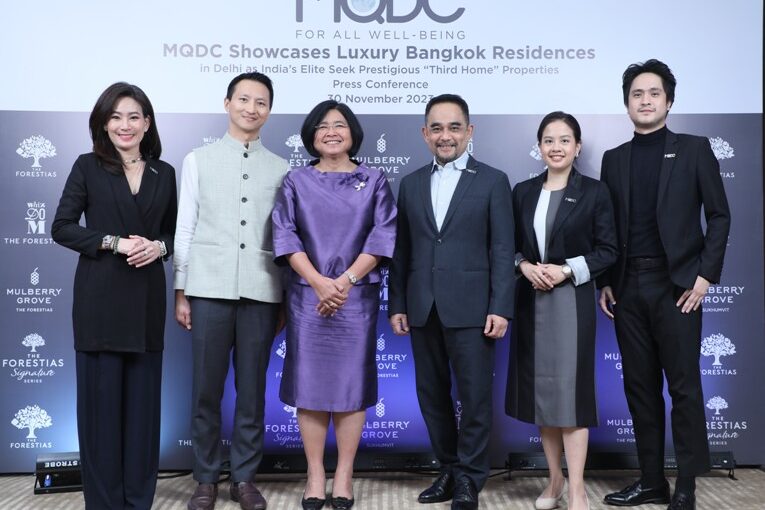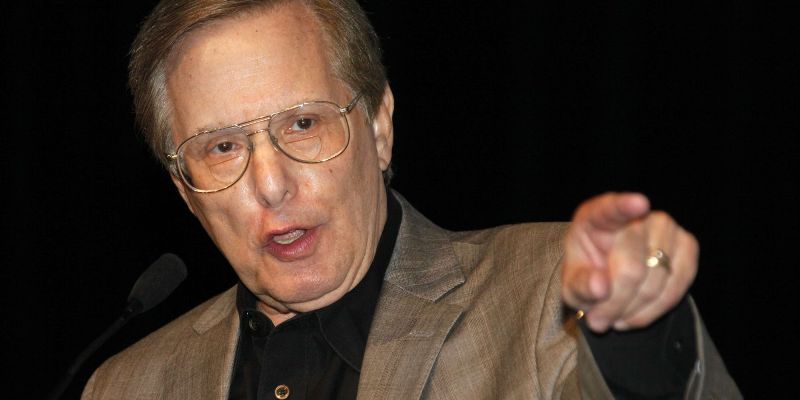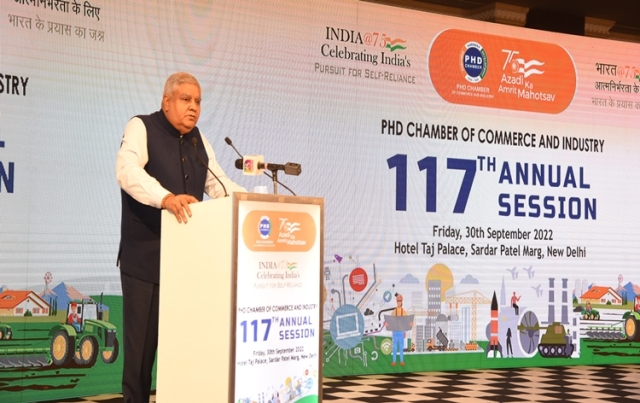
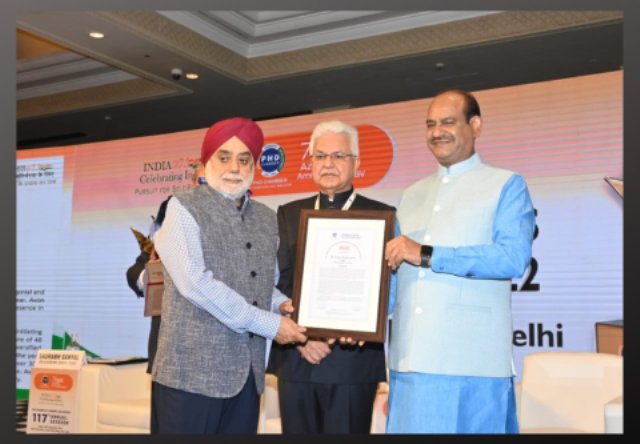
The 117th Annual Session of the PHD Chamber of Commerce and Industry (PHDCCI) held in New Delhi became a platform narrating the big picture of India's growth story with an array of perspectives by eminent people from the government, industry, services and bureaucracy.
Mr Jagdeep Dhankhar, the Vice President of India was the chief guest at the grand inaugural on Sept 30 at the Taj Palace Hotel. The Second Lady of India, Dr Sudesh Dhankhar was also present.
The theme of the annual session of this industry chamber with pre-Independence moorings was “India@75: Celebrating India’s Pursuit for Self-Reliance.”
The Vice President, in his address, congratulated the chamber for its achievements and noted that the business and economy are in a phase of umpteen opportunities. He hailed many of the affirmative steps taken by the government of India that helped the industry and made India the fifth largest economy in the world.
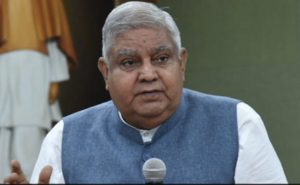 Vice President Mr Jagdeep Dhankhar
Vice President Mr Jagdeep Dhankhar
Dhankar mentioned some of the affirmative steps and highlighted the stellar success of India on the start-up front. Dhankar said the 75,000 plus startups and 100 unicorns have proved that India can play a decisive role on the economy and technology fronts with the advantage of a skilled and educated youth population.
The Vice President also deplored the smear campaigns seeking to belittle the success of India. They are blatantly ignoring the giant strides made by India in industry, technology, and also the contribution of farmers, professionals, MSMEs and other sectors in sustaining that growth.
Industry Minister hints new law on ease of businessUnion minister for commerce and industry Piyush Goyal speaking at the event announced that the government intends to bring a bill in the winter session of Parliament to decriminalise more offences to reduce India Inc’s compliance burden and promote greater ease of doing business.
Goyal told the businessmen that India's growth story is solid and the country continues to be the “fastest” growing economy in the world.
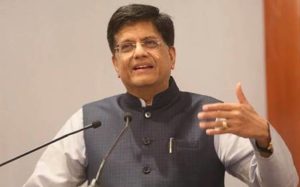 Piyush Goyal, Union Industry minister
Piyush Goyal, Union Industry minister
At the same time, Goyal urged the industry leaders to eliminate the “protectionist” mindset and look for the gains flowing from many free trade agreements India has signed with other countries with more in the pipeline.
The industry minister said India has managed the inflation threat pretty well when many advanced nations were grappling with the pressure of the price spiral. Despite external headwinds, India managed to rein in inflation at an average of 7 per cent as of August while the same was 8.3 in the US and 9.9 in the UK and Germany’s inflation peaked at 11 per cent.
Business Awards presentedIn the plenary session, PHDCCI Business Excellence Awards were presented to various industrialists. Lok Sabha Speaker Om Birla gave away the awards and released the 117th Year Book of PHDCCI. In his address, Om Birla urged the industry to use the conducive ecosystem to make India a global hub of manufacturing excellence.
The business awardees were Manish Gupta, Chairman, Insolation Energy Limited as the Distinguished Entrepreneur (MSME Category), Onkar Singh Pahwa, CMD, Avon Cycles as Distinguished Entrepreneur and Ms Seema, CEO and Co-Founder of FIA Global, as the Distinguished Business Woman.
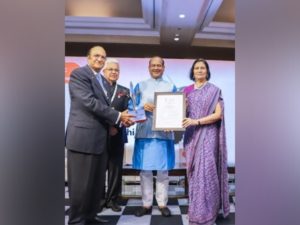 Raghupath Singhania, CMD of JK Tyre and Industries received the award
Raghupath Singhania, CMD of JK Tyre and Industries received the award
Ramesh Agarwal, CMD, Agarwal Packers, and Movers Limited received the award for Outstanding Contribution to Social Welfare while Suresh P Manglani, CEO of Adani Total Gas Limited, received the Good Corporate Citizen award.
The Lifetime Achievement Award in the Individual category went to Dr Raghupath Singhania, CMD of JK Tyre and Industries Ltd.
Rajnath Singh on defence opportunitiesThe plenary session on indigenisation of the defence sector in India had Union Minister for Defence, Rajnath Singh as chief guest and the minister said the Government is focussing on innovative solutions to empower the defence sector with expanded opportunities for MSMEs as suppliers.
The plenary session on defence was also attended by Vice Chief of Army Staff, Lt. Gen. Baggavalli Somasekhar Raju, and Dr Adrian Haack, Director of India office, Konrad Adenauer Stiftung.
Minister Rajnath Singh in his virtual address said the PHDCCI can work as a catalyst in making self-reliance a reality in defence manufacturing. The concept is in sync with Prime Minister Narendra Modi’s vision of AtmaNirbhar Bharat.
Noting the linkage of national security with a self-reliant defence production base, the Defence Minister said the boost in Indian defence manufacturing is also giving a fillip to the ‘Make in India’ mission.
The corpus of the Innovation fund in defence excellence is Rs 498 crores and it will benefit 300 new start-ups working in the realm of innovative design and development in the defence sector.
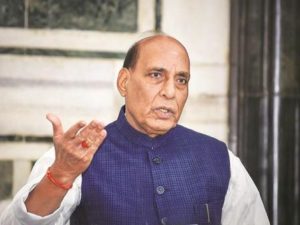 Union Defence Minister Rajnath Singh
Union Defence Minister Rajnath Singh
The opening of two defence corridors, in UP and Tamil Nadu, has put India in a win-win situation. The results are showing up with India now in the club of top 25 defence exporting countries.
Dr Adrian Haack said India’s Make in India motto augurs well for the defence sector all over the world. The drive of self-reliance can help India rise as one of the biggest defence industries in the world.
Vice Chief of Army, Lt. Gen. Baggavalli Somasekhar Raju congratulated the PHDCCI for the offer to absorb 10 per cent of Agniveers under the government’s Agnipath scheme. Noting that self-reliance is vital to the defence forces, Raju explained how the passion for the best technology will drive the association of industries with the defence sector.
Pradeep Multani bullish on India’s growthPradeep Multani, President, PHDCCI in his speech noted the annual session is happening at a time India is celebrating its 76th year of Independence and “Azaadi Ka Amrit Mahotsav”. India stands before the world as a shining example of growth and stability amid the global crisis.
New leadership of PHDCCI unveils action planMeanwhile, the new leadership of PHDCCI has announced its agenda at a press conference in New Delhi. Saket Dalmia, the new president of PHDCCI exuded optimism that the Indian economy would grow at 6-7 percent during the current fiscal year.
According to Dalmia, production has bounced back, and the demand situation looks excellent. His statement did not endorse the slashed forecast by the International Monetary Fund (IMF) that cut India’s growth forecast to 6.8 percent in 2022.
Thrust on ExportsDalmia said the PHDCCI has identified 75 potential products including agriculture and chemicals for intensive exports to 75 countries to meet India’s trade target of 750 billion dollars by 2027. Other priority products are textiles, auto, and pharmaceutical items. The export destinations include the US, European Union, China, and the GCC states.
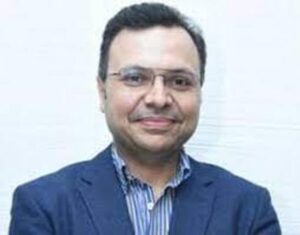 Saket Dalmia, PHDCCI President
Saket Dalmia, PHDCCI President
Among the challenges for the industry, Dalmia noted the cost of capital as a serious issue faced by the MSME sector and urged the RBI and the governments to look into the problem and resolve it fast.
The chamber is also planning an initiative for facilitating more women start-ups in line with the PM’s vision of “Nari Shakti” (women power) driving the economy, added the chamber president.
Sanjeev Agrawal, senior vice president, said PHDCCI, would protect innovations done by its MSME members via hand-holding and exposure to the steps for incorporating IPR regulations.
The MSME facilitation centre of the chamber will also support MSMEs in scaling up businesses and accessing new technology. The member industries will be encouraged for registering with Government E-marketplace, and other platforms that deliver faster access to finance and markets.
Hemant Jain, the vice president highlighted the importance of innovation and the need for adopting new technologies. He said PHDCCI would actively work with pioneers of innovative ideas to achieve early success. The chamber will also take up matters such as the ease of doing business, cost of capital, and procedural problems in setting up new-age business with the central and state governments.

